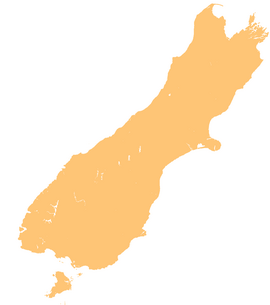
Tasman District is a local government district in the northwest of the South Island of New Zealand. It borders the Canterbury Region, West Coast Region, Marlborough Region and Nelson City. It is administered by the Tasman District Council, a unitary authority, which sits at Richmond, with community boards serving outlying communities in Motueka and Golden Bay / Mohua. The city of Nelson has its own unitary authority separate from Tasman District, and together they comprise a single region in some contexts, but not for local government functions or resource management (planning) functions.

The Polynesian Triangle is a region of the Pacific Ocean with three island groups at its corners: Hawaii, Easter Island and New Zealand (Aotearoa). It is often used as a simple way to define Polynesia.

Motueka is a town in the South Island of New Zealand, close to the mouth of the Motueka River on the western shore of Tasman Bay. It is the second largest in the Tasman Region, with a population of 8,320 as of June 2023.

Lake Hāwea is New Zealand's ninth largest lake.

The town of Palmerston, in New Zealand's South Island, lies 50 kilometres to the north of the city of Dunedin. It is the largest town in the Waihemo Ward of the Waitaki District, with a population of 890 residents. Palmerston grew at a major road junction: State Highway 1 links Dunedin and Waikouaiti to the south with Oamaru and Christchurch to the north, while State Highway 85 heads inland to become the principal highway of the Maniototo. The Main South Line railway passes through the town and the Seasider tourist train travels from Dunedin to Palmerston and back once or twice a week. From 1880 until 1989, the town acted as the junction between the main line and a branch line that ran inland, the Dunback and Makareao Branches.

The Motueka River is located in the north of the South Island of New Zealand and is a popular tourist destination for watersports and fishing. The Motueka flows 116 kilometres (72 mi) from the mountains 40 km west of the city of Nelson in the southeast of the catchment and flows north to the Tasman Bay.

Tākaka is a small town situated at the southeastern end of Golden Bay, at the northern end of New Zealand's South Island, located on the lower reaches of the Tākaka River. State Highway 60 runs through Takaka and follows the river valley before climbing over Tākaka Hill, to Motueka linking Golden Bay with the more populated coast of Tasman Bay to the southeast. The town is served by Tākaka Aerodrome.

Tasman Bay, originally known in English as Blind Bay, is a large V-shaped bay at the north end of New Zealand's South Island. Located in the centre of the island's northern coast, it stretches along 120 kilometres (75 mi) of coastline and is 70 kilometres (43 mi) across at its widest point. It is an arm of the Tasman Sea, lying on the western approach to Cook Strait.

Ngātīmoti or Ngatimoti is a town near Motueka in New Zealand's South Island.
Kāraerae was a great migratory waka (canoe) used by early Polynesian settlers in New Zealand according to Māori tradition, in which it is said that after Tamatea-arikinui wrecked the Tākitimu at Te Waewae Bay in Southland, he built the Kāraerae and sailed back to the North Island.

The Wangapeka River is a river of the Tasman Region of New Zealand's South Island. It rises in two branches, the North Branch and the South Branch, in the Matiri Range within Kahurangi National Park, meeting some 25 kilometres southeast of Karamea. It flows generally northeast to reach the Motueka River 30 kilometres south of Motueka.
Waimea-Picton was a parliamentary electorate in the Marlborough and Nelson Regions of New Zealand, from 1887 to 1893.

Ui-te-Rangiora or Hui Te Rangiora is a legendary Polynesian navigator from Rarotonga who is claimed to have sailed to the Southern Ocean and sometimes to have discovered Antarctica.
Te Pūoho-o-te-rangi (died 1836 or 1837), also known as Te Pūoho-ki-te-rangi, was a notable New Zealand tribal leader. A Māori, he identified with the Ngāti Tama and Ngāti Toa iwi. Te Pūoho was born in Poutama, Taranaki, New Zealand, possibly in the late eighteenth century. Late in his life, he moved to the South Island and settled at Parapara.
State Highway 61 (SH 61) is a former New Zealand state highway in the Tasman Region of the South Island. It links the coastal town of Motueka with SH 6, the main route to the South Island's West Coast. Along with several other state highways, its status was revoked at the beginning of the 1990s. The route is now usually referred to as the Motueka Valley Highway.
Woodstock is a small settlement in the Tasman District of the northern South Island of New Zealand. It is located on the Motueka Valley Highway, close to the eastern bank of the Motueka River, some 20 kilometres southwest of Motueka, at the junction of the Motueka River and its small tributary, the Dove River.
Brooklyn is a settlement and rural valley in the Tasman District of New Zealand's upper South Island. It is located on the outskirts of Motueka, and is dominated by orchards.

Parapara is a coastal location in the Tasman District of New Zealand. It is located near Golden Bay, close to the edge of the Parapara Inlet, between Tākaka and Collingwood.

Atholl John Anderson is a New Zealand archaeologist who has worked extensively in New Zealand and the Pacific. His work is notable for its syntheses of history, biology, ethnography and archaeological evidence. He made a major contribution to the evidence given by the iwi (tribe) Ngāi Tahu to the Waitangi Tribunal.

Motueka Island, also known by the name Pigeon Island, is an island off the coast of the Coromandel Peninsula in New Zealand.















